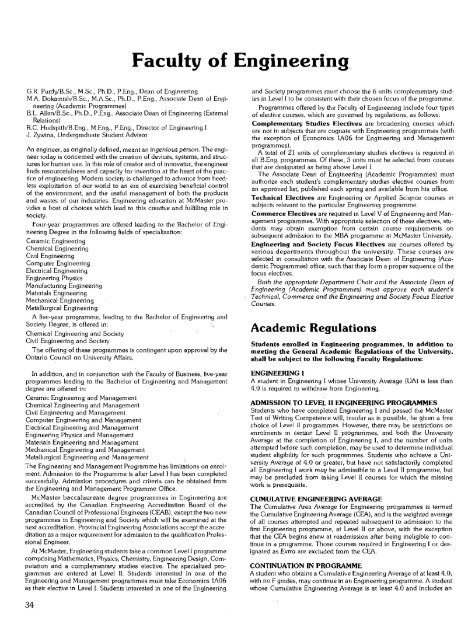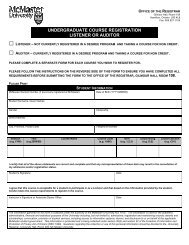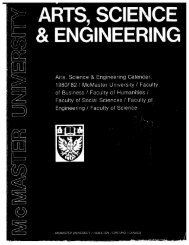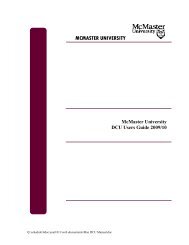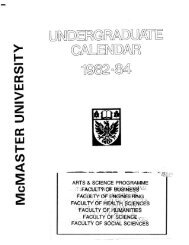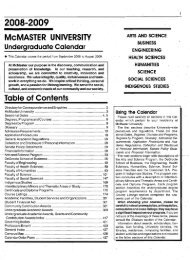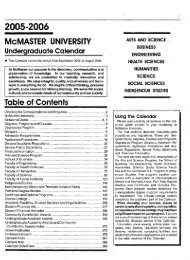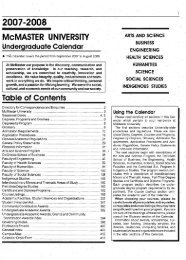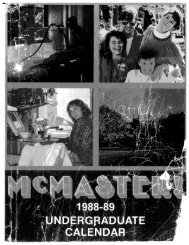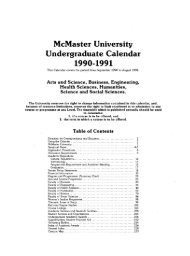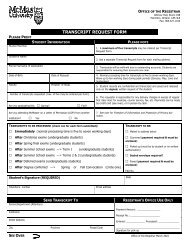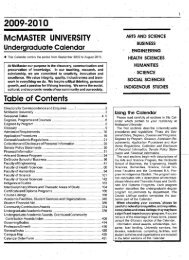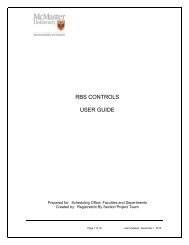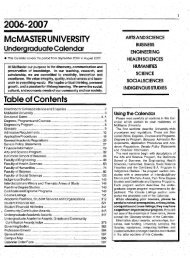1991/1992 - Office of the Registrar - McMaster University
1991/1992 - Office of the Registrar - McMaster University
1991/1992 - Office of the Registrar - McMaster University
Create successful ePaper yourself
Turn your PDF publications into a flip-book with our unique Google optimized e-Paper software.
Faculty <strong>of</strong> Engineering~<br />
G.R. Purdy/B.Sc., M.Sc., Ph.D., P.Eng., Dean <strong>of</strong> Engineering<br />
M.A. DokainishlB.Sc., M.A.Sc., Ph.D., P.Eng., Associate qean <strong>of</strong> Engineering<br />
(Academic Programmes)<br />
B.L. AlIen/B.Sc., Ph.D., P.Eng., Associate Dean <strong>of</strong> Engineering (External<br />
Relations)<br />
R.c. HudspithlB.Eng., M.Eng., P.Eng., Director <strong>of</strong> Engineering I<br />
J. Zywina, Undergraduate Student Advisor<br />
An engineer, as originally defined, meant an ingenious person. The engineer<br />
today is concerned with <strong>the</strong> creation <strong>of</strong> devices, systems, and structures<br />
for human use. In this role <strong>of</strong> creator and <strong>of</strong> innovator, <strong>the</strong> engineer<br />
finds resourcefulness and capacity for invention at <strong>the</strong> heart <strong>of</strong> <strong>the</strong> practice<br />
<strong>of</strong> engineering. Modern society is challenged to advance from heed~<br />
less exploitation <strong>of</strong> our world to an era <strong>of</strong> exercising beneficial control<br />
<strong>of</strong> <strong>the</strong> environment, and <strong>the</strong> useful management <strong>of</strong> both <strong>the</strong> products<br />
and wastes <strong>of</strong> our industries. Engineering education at <strong>McMaster</strong> provides<br />
a host <strong>of</strong> choices which lead to this creative and fulfilling role in<br />
SOciety.<br />
Four-year programmes are <strong>of</strong>fered leading to <strong>the</strong> Bachelor <strong>of</strong> Engineering<br />
Degree in <strong>the</strong> follOWing fields <strong>of</strong> specialization:<br />
Ceramic Engineering<br />
Chemical Engineering<br />
Civil Engineering<br />
Computer Engineering<br />
Electrical Engineering<br />
Engineering Physics<br />
ManufactUring Engineering<br />
Materials Engineering<br />
Mechanical Engineering<br />
Metallurgical Engineering<br />
A five-year programme, leading to <strong>the</strong> Bachelor <strong>of</strong> Engineering and<br />
Society Degree, is <strong>of</strong>fered in: \<br />
Chemical Engineering and Society<br />
Civil Engineering and Society<br />
The <strong>of</strong>fering <strong>of</strong> <strong>the</strong>se programmes is contingent upon approval by <strong>the</strong><br />
Ontario Council on <strong>University</strong> Affairs.<br />
In addition, and in conjunction with <strong>the</strong> Faculty <strong>of</strong> Business, five-year<br />
programmes leading to <strong>the</strong> Bachelor <strong>of</strong> Engineering and Management<br />
degree are <strong>of</strong>fered in:<br />
Ceramic Engineering and Management<br />
Chemical Engineering and Management<br />
Civil Engineering and Management<br />
Computer Engineering and Management<br />
Electrical Engineering and Management<br />
Engineering Physics and Management<br />
Materials Engineering and Management<br />
Mechanical Engineering and Management<br />
Metallurgical Engineering and Management<br />
The Engineering and Management Programme has limitations on enrol.:.<br />
ment Admission to <strong>the</strong> Programme is after Level I has been completed<br />
successfully. Admission procedures and criteria can be obtained from<br />
<strong>the</strong> Engineering and Management Programme <strong>Office</strong>.<br />
<strong>McMaster</strong> baccalaureate degree programmes in Engineering are<br />
accredited by <strong>the</strong> Canadian Engineering Accreditation Board <strong>of</strong> <strong>the</strong><br />
Canadian Council <strong>of</strong> Pr<strong>of</strong>essional Engineers (CEAB), except <strong>the</strong> two new<br />
programmes in Engineering and Society which will be examined at <strong>the</strong><br />
next accreditation. Provincial Engineering Associations accept <strong>the</strong> accreditation<br />
as ~ major requirement for admission to <strong>the</strong> qualification Pr<strong>of</strong>essional<br />
Engineer.<br />
At <strong>McMaster</strong>, Engineering students take a common Level I programme<br />
comprising Ma<strong>the</strong>matics, Physics, ChemiStry, Engineering Design, Computation<br />
and a complementary studies elective. The specialized programmes<br />
are entered at Level II. Students interested in one <strong>of</strong> <strong>the</strong><br />
Engineering and Management programmes must take Economics 1A06<br />
as <strong>the</strong>ir elective in Level I. Students interested in one <strong>of</strong> <strong>the</strong> Engineering<br />
and Society programmes must choose <strong>the</strong> 6 units complementary studies<br />
in Level I to be consistent with <strong>the</strong>ir chosen focus <strong>of</strong> <strong>the</strong> programme.<br />
Programmes <strong>of</strong>fered by <strong>the</strong> Faculty <strong>of</strong> Engineering include four types<br />
<strong>of</strong> elective courses, which are governed by regulations, as follows:<br />
Complementary Studies Electives are broadening courses which<br />
are not in subjects that are cognate with Engineering programmes (with<br />
<strong>the</strong> exception <strong>of</strong> Economics 1A06 for Engineering and Management<br />
programmes) .<br />
A total <strong>of</strong> 21 units <strong>of</strong> complementary studies electives is required in<br />
all B.Eng. programmes. Of <strong>the</strong>se, 3 units must be selected from courses<br />
that are designated as being above Level I.<br />
The ASSOciate Dean <strong>of</strong> Engineering (Academic Programmes) must<br />
authorize each student's complementary studies elective courses from<br />
an approved list, published each spring and available from his <strong>of</strong>fice.<br />
Technical Electives are Engineering or Applied Sci~nce courses in<br />
subjects relevant to <strong>the</strong> particular Engineering programme.<br />
Commerce Electives are required in !.:.evel V <strong>of</strong> Engineering and Management<br />
programmes. With appropriate selection <strong>of</strong> <strong>the</strong>se electives, students<br />
may ·obtain exemption from certain course requirements on<br />
subsequent admission to <strong>the</strong> MBA programme at <strong>McMaster</strong> <strong>University</strong>.<br />
Engineering and Society Focus Electives are courses <strong>of</strong>fered by<br />
various departments throughout <strong>the</strong> university. These courses are<br />
selected in consultation with <strong>the</strong> Associate Dean <strong>of</strong> Engineering (Academic<br />
Programmes) <strong>of</strong>fice, such that <strong>the</strong>y form a proper sequence <strong>of</strong> <strong>the</strong><br />
focus electives.<br />
Both <strong>the</strong> appropriate Department Chair and <strong>the</strong> Associate Dean <strong>of</strong><br />
Engineering (AcademiC Programmes) must approve each student's<br />
Technical, Commerce and <strong>the</strong> Engineering and Society Focus Elective<br />
Courses.<br />
'<br />
Academic Regulations<br />
Students enrolled in Engineering programmes;. in addition to<br />
meeting <strong>the</strong> General Academic Regulations <strong>of</strong> <strong>the</strong> <strong>University</strong>,<br />
shall be subject to <strong>the</strong> following Faculty Regulations:<br />
ENGINEERING I<br />
A student in Engineering I whose <strong>University</strong> Average (UA) is less than<br />
4.0 is required t9 withdraw from Engineering.<br />
ADMISSION TO LEVEL II ENGINEERING PROGRAMMES<br />
Students who have completed Engineering I and passed <strong>the</strong> <strong>McMaster</strong><br />
Test <strong>of</strong> Writing Competence will, ins<strong>of</strong>ar as is possible,'be given a free<br />
choice <strong>of</strong> Level II programmes. However, <strong>the</strong>re may be restrictions on<br />
enrolments in certain Level II programmes, and both <strong>the</strong> <strong>University</strong><br />
Average at <strong>the</strong> completion <strong>of</strong> Engineering I, and <strong>the</strong> number <strong>of</strong> units<br />
attempted before such completion, may be used to determine individual<br />
student eligibility for such programmes. Students who achieve a <strong>University</strong><br />
Average <strong>of</strong> 4.0 or greater, but have not satisfactorily completed<br />
all Engineering I work may be admissible to a Level II programme, but<br />
may be precluded from taking Level II courses for which <strong>the</strong> missing<br />
work is prerequisite.<br />
CUMULATIVE ENGINEERING AVERAGE<br />
The Cumulative Area Average for Engineering program,nes is termed<br />
<strong>the</strong> Cumulative Engineering Average (CEA), and is <strong>the</strong> weighted average<br />
<strong>of</strong> all courses attempted and repeated subsequent to admission to <strong>the</strong><br />
first Engineering programme, at Level II or above, with <strong>the</strong> exception<br />
that <strong>the</strong> CEA begins anew at readmission after being ineligible to continue<br />
in a programme. Those courses required in Engineering I or designated<br />
as Extra are excluded from <strong>the</strong> CEA.<br />
CONTINUATION IN PROGRAMME<br />
A student who obtains a Cumulative Engineering Average <strong>of</strong> at least 4.0,<br />
with no F grades, may continue in an Engineering programme. A student<br />
whose Cumulative Engineering Average is at least 4.0 and includes an<br />
34


